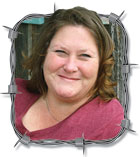Bossman Eric asked me recently if I had heard of “boutique cattle.” His daughter’s friend was excited for her “boutique cattle” to arrive.
The friend does not have a farm, and I am not sure if she even has a backyard, but she will have “boutique cattle,” for which she paid “a lot” of money. I don’t know what breed or breeds these boutique cattle will be, but I wish her lots of luck.
I guess boutique cattle are the new “in” thing. I see many posts on social media about people making pets of miniature cattle, horses, sheep, goats and pigs . I’m a firm believer in allowing folks to do their own thing. I don’t question why they do something or try to persuade them to change how they operate. I look at it this way: their property and their animals. No matter how much it might ruffle my feathers, I try to keep out of it; but sometimes, I can’t help myself, especially if I see animals aren’t being cared for properly.
I’m afraid boutique cattle are someone’s way of trying to get rich quick. Yes, there are smaller or miniature breeds of cattle, and I love the look of many of those breeds, but marketing them as “boutique cattle” is deceptive and is a terrible reflection on the reputable producers of those animals. I don’t understand how the phrase “boutique” came into play. A boutique, to me, is an up-scale store where you buy a $50 t-shirt. I guess it’s all in the marketing.
Remember the potbelly pig craze? Potbelly pigs get a lot bigger than many people realize, can be destructive and are, let’s face it, pigs. When the bottom fell out of that market, potbelly pigs sometimes just showed up. We had one show up with some mares. When you would call the horses down, that little pig ran as hard and fast as he could to keep with them; it was comical. It belonged to a neighbor up the road, and they eventually came and got it, but it took a while.
It isn’t just the “fad” livestock that can cause folks problems either. We have so many people moving into the Ozarks who have more than a backyard for the first time, so they want to raise livestock, but it doesn’t always work out.
I was recently at a tire shop and stuck up a conversation with another patron. She talked about her animals, specifically her pig, two heifers, and two 2-year-old Jersey bulls.
Her family had never been around livestock but planned to process the pig and bulls for meat all by themselves. The bulls, she said, were mean – we all know the reputation of dairy bulls – and one of them injured her husband. She also thought one of the heifers was bred and didn’t know what to do if it had trouble calving. Her family was in over their heads, and she knew it. She was visibly upset about the situation. She said she thought they could handle livestock, but they were mistaken. Someone told them to get cattle, so they did, not knowing anything about them. She wanted the cattle gone before anyone else got hurt and before the heifer calved.
I told her the best option was the sale barn. Luckily, a young lady I know walked into the shop as I was leaving. I told my newfound friend that the young lady might be able to haul them for her. As I headed to the door, the two were getting the details hashed out.
Will you be the grifter who makes a quick buck and laughs all the way to the bank? Or will you be the gifter who gives advice and shares information to help people make good choices? What kind of reputation do you want your farm or ranch to have? A breeder of “boutique cattle” or an honest, trustworthy operation with a solid foundation in the community? The answer is pretty easy for me.
Julie Turner-Crawford is a native of Dallas County, Mo., where she grew up on her family’s farm. She is a graduate of Missouri State University. To contact Julie, call 1-866-532-1960 or by email at [email protected].






